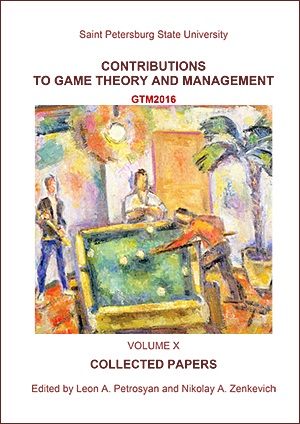Games with Incomplete Information on the Both Sides and with Public Signal on the State of the Game
Abstract
Supposing that Player 1's computational power is higher than that of Player 2, we give three examples of different kinds of public signal about the state of a two-person zero-sum game with symmetric incomplete information on both sides (both players do not know the state of the game) where Player 1 due to his computational power learns the state of the game meanwhile it is impossible for Player 2. That is, the game with incomplete information on both sides becomes a game with incomplete information on the side of Player 2. Thus we demonstrate that information about the state of a game may appear not only due to a private signal but as a result of a public signal and asymmetric computational resources of players.
Keywords:
zero-sum game, incomplete information, asymmetry, finite automata
Downloads
References
Downloads
Published
How to Cite
Issue
Section
License
Articles of "Contributions to Game Theory and Management" are open access distributed under the terms of the License Agreement with Saint Petersburg State University, which permits to the authors unrestricted distribution and self-archiving free of charge.




